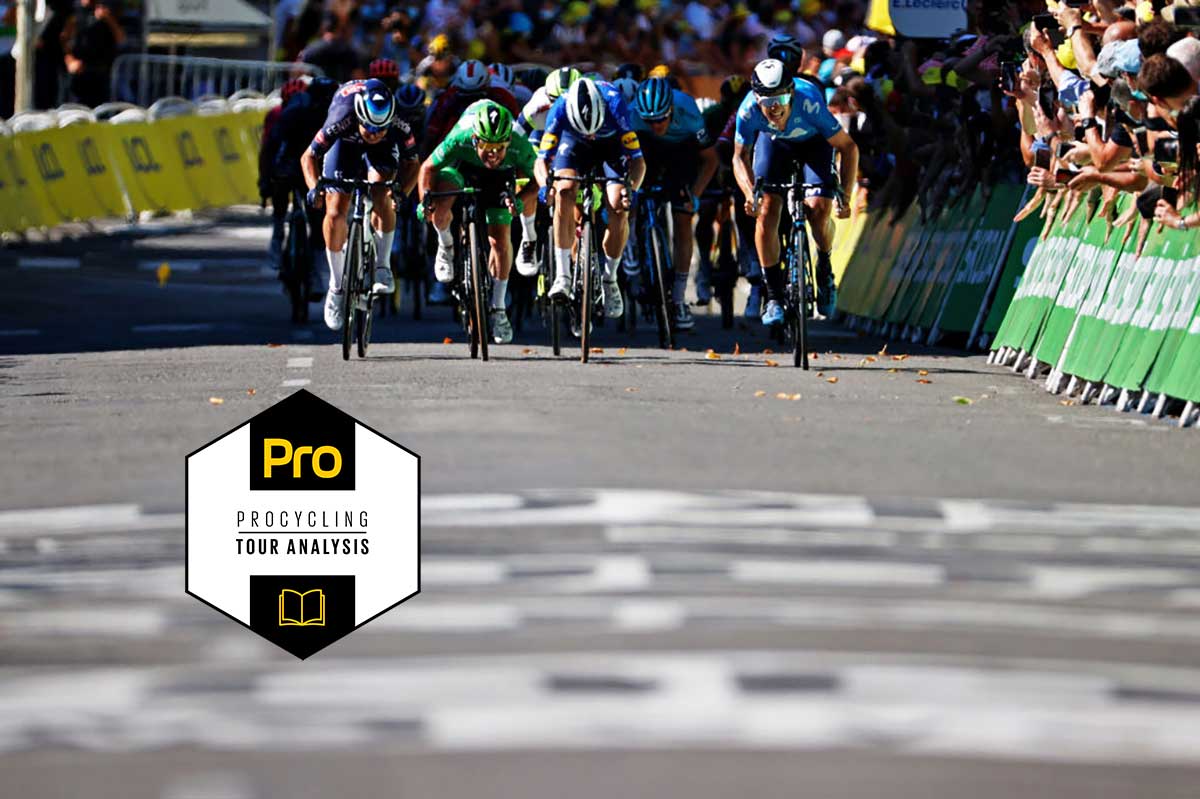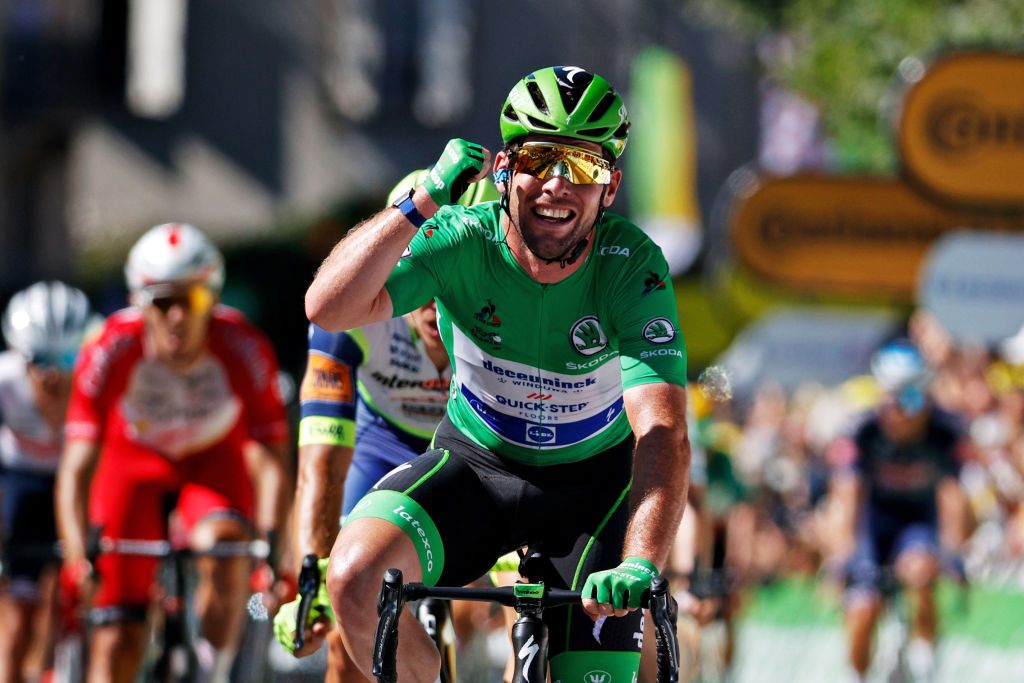Tour de France stage 13 analysis: The butterfly effect and Cavendish's record
Mark Cavendish's improbable path to his 34th Tour victory is a metaphor for his whole season.

Things aren't quite happening the way they are supposed to in this Tour de France. Thursday's stage in Nîmes was a nailed-on sprint – the last non-sprinter to win in the city was Aitor González in 2004. Then Nils Politt (Bora-Hansgrohe) won, a full quarter of an hour before the bunch rolled in. Conversely, no sprinter had ever won in Carcassonne. Nevertheless, Mark Cavendish took his historic 34th Tour stage victory in the 13th stage of the 2021 Tour, 13 years to the day after his first.
The sprint didn't quite happen the way it was supposed to, either. Despite an attritional, kiln-hot day in the Languedoc and a crash which cost Cavendish's Deceuninck-QuickStep team their main bunch engine Tim Declercq for the final 60 kilometres, the Belgian squad still managed to emerge in the final 1.5 kilometres with a line of four riders on the front of the bunch: Kasper Asgreen, Davide Ballerini, Michael Mørkøv and Mark Cavendish. In a Tour that has been marked by chaos, disruption and unpredictability, the final mile of the stage at least looked straightforward: Asgreen from 1.5 kilometres to 700 metres, Ballerini from 700 to 400, Mørkøv from 400 to 200 and then Cavendish.
But chaos intervened again and what looked like a straightforward sprint train finish turned into a free-for-all as Team DSM's Nils Eekhoff surged around the outside of a curve in the road with 600 metres to go, just as Asgreen faded, dragging up his team's sprinter Cees Bol, but also enough riders to swamp Cavendish. Cavendish was boxed, finding himself on Nacer Bouhanni's wheel. Eekhoff ran out of steam, Ballerini accelerated so hard that he went metres clear, and it was hard to see a way through for the British sprinter, who jumped from Bouhanni's wheel to that of Michael Matthews (Team BikeExchange), then around the Australian as he tried to re-find the safe haven of Mørkøv's slipstream. At the same time, Iván García Cortina (Movistar) launched his sprint in pursuit of Ballerini. Mørkøv found the Spanish rider's wheel, Cavendish behind, with 125 metres to go. Jasper Philipsen (Alpecin-Fenix), having just won the battle for Cavendish's wheel against Danny Van Poppel (Intermarché-Wanty-Gobert), went on Cavendish's right, almost shutting the door but leaving enough space for the Brit to launch his own sprint.
This is the way it has been through this Tour, and not only in the sprints. Tao Geoghegan Hart and Richie Porte lost time on stage 1 and Geraint Thomas crashed on stage 3, ruining any chance the Ineos Grenadiers had of ganging up on Tadej Pogačar (UAE Team Emirates). Primož Roglič (Jumbo-Visma) crashed on stages 1 and 3, and his injuries eventually put him out of the GC, then the race. These incidents, along with others, each had a knock-on effect. Everything that happens affects everything else that happens: Cavendish might not have extricated himself from the mélée of riders just at the moment that García Cortina streamed past, opening up the Brit's path to victory in Carcassonne.

The stage 13 sprint was a ready-made metaphor for Cavendish's unlikely path to becoming the joint record holder of stage wins with Eddy Merckx. The Brit has emerged at the very head of affairs, but a lot of things have had to happen for him to get there.
For the past three years, the sprint-focused features on the men's side of the sport in Procycling magazine have been about the golden generation of bunch finishers who had emerged as the fastest riders in the world. Between 2008 and 2013, it was all about Cavendish. 2013 to 2014 were Kittel's years; Greipel in 2015, Cavendish again in 2016 and Kittel in 2017. What those 10 years had in common was that a single sprinter had dominated the sport every season. From 2018, however, we couldn't find much to separate a whole generation of sprinters: Dylan Groenewegen, Caleb Ewan, Fernando Gaviria, Sam Bennett, Arnaud Démare, Elia Viviani and Pascal Ackermann shared the Grand Tour stage wins between them. In the 2018 Tour, while Groenewegen and Gaviria divided up the sprint wins, it was just about possible to perceive a struggling Mark Cavendish in the background, barely able to get himself anywhere near the front before the sprints were launched, then fading each time.
The British sprinter's travails with the Epstein Barr virus over several seasons and his poor year at Bahrain-McLaren almost ended his career at the end of 2020. He had bad results and he was looking for a new team very late in the offseason, with few realistic possibilities in a tough transfer season for out-of-contract riders. At this point, it looked like he might not even get a ride for 2021. This was rock bottom.
Get The Leadout Newsletter
The latest race content, interviews, features, reviews and expert buying guides, direct to your inbox!
However, things started happening, and they kept happening. He got a contract with Deceuninck-QuickStep, who didn't have a budget, but welcomed the fact that Cavendish could bring sponsorship with him. He started riding better. Placings in the spring semi-classics turned into wins in Turkey against limited opposition, which turned into a win at the Belgium Tour against much better riders.
At the same time, our golden generation of sprinters started experiencing the same headwinds that Cavendish had over the previous few years: Groenewegen was a critical factor in the terrible crash at the Tour de Pologne that seriously injured Fabio Jakobsen, served a suspension and then sat out the Tour while Jumbo-Visma focused on Roglič's GC target. Bennett, Cavendish's teammate and the 2020 Tour's green jersey winner, succumbed to injury and his relations with team boss Patrick Lefevere became strained. Gaviria has had his own struggles with illness, then contracted COVID-19 twice in 2020. Viviani never found the success with Cofidis that he had with Deceuninck. Ackermann had his own falling out with the Bora-Hansgrohe team. Ewan (Lotto-Soudal) crashed and broke his collarbone on stage 3. Démare (Groupama-FDJ) didn't look sharp in the sprints of this Tour and was eliminated in the Alps.
Any one of those many, many things not happening might have at least prevented one of Cavendish's victories. Even his Tour berth looked unlikely as late as mid-June; now he's won four out of 13 stages, has equalled Eddy Merckx's record and has two realistic chances to put himself ahead, in Libourne on stage 19 and in Paris two days later, if he can survive the Pyrenees and his legs recover from the huge effort he made to win in Carcassonne.
Cavendish's comeback and his record-setting exploit has been an object lesson in self-belief and never giving up. Also, a reminder to all of us that there is a difference between what is improbable and what is impossible.
Things might not be happening as they are supposed to at this Tour. But at the same time, now we have watched it with our own eyes, Mark Cavendish winning his 34th stage looked inevitable, even if at certain points over the last few years, and even in the final 500 metres of the sprint in Carcassonne, the path ahead hasn't been clear until it has appeared.
Edward Pickering is Procycling magazine's editor.
Procycling magazine: the best writing and photography from inside the world's toughest sport. Pick up your copy now in all good newsagents and supermarkets, or get a Procycling subscription.
Edward Pickering is Procycling magazine's editor. He graduated in French and Art History from Leeds University and spent three years teaching English in Japan before returning to do a postgraduate diploma in magazine journalism at Harlow College, Essex. He did a two-week internship at Cycling Weekly in late 2001 and didn't leave until 11 years later, by which time he was Cycle Sport magazine's deputy editor. After two years as a freelance writer, he joined Procycling as editor in 2015. He is the author of The Race Against Time, The Yellow Jersey Club and Ronde, and he spends his spare time running, playing the piano and playing taiko drums.